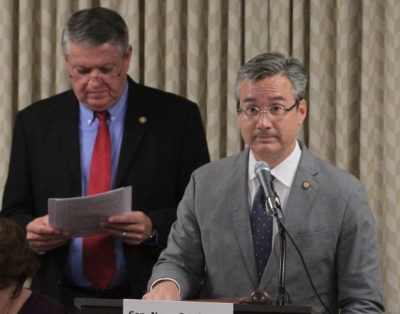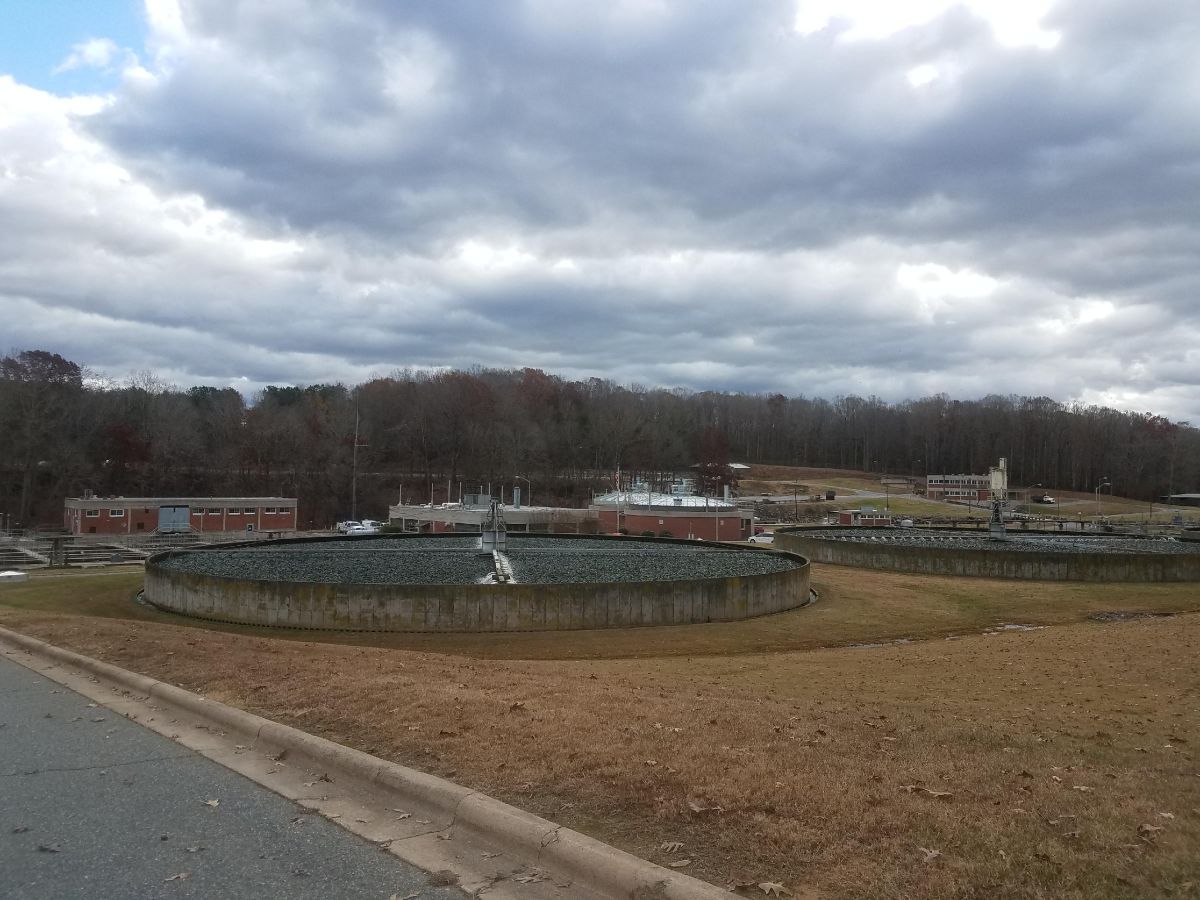RALEIGH — A last-minute amendment Friday to the Senate’s version of a bill to expand state efforts on GenX and emerging contaminants gave House negotiators some of what they wanted.
But as the House readies for a potential vote on the measure Tuesday, the question is whether what the Senate offered is enough.
Supporter Spotlight
House Bill 189, now titled the Water Safety Act, passed the Senate on Friday afternoon by 27-13 vote that fell mostly along party lines.

House leaders had said Thursday that the bill, as drafted, would not pass the House and asked the Senate to revise certain sections. One in particular was a $2.4 million allocation to the Department of Environmental Quality they said too tightly controlled how DEQ could use the funds.
One amendment approved Friday allows DEQ more flexibility in how it uses about a third of the money it’s allocated. Another amendment expands the scope of new university-led research to include the spread of contaminants through air emissions.
Although the final outcome of the proposal was still up in the air over the weekend, House Speaker Tim Moore, R-Cleveland, said last week that the House plans a voting session on Tuesday.
The House was scheduled for only a skeleton session Monday.
Supporter Spotlight
Not Enough
Initial reaction to the Senate changes indicate they likely didn’t go far enough. Rep. Chuck McGrady, R-Henderson, a key House budget writer, said he did not expect the House to take action on the bill as returned by the Senate.
“While I haven’t had a chance to consult with my colleagues whose constituents are most directly affecting by GenX, I doubt the amendments are enough to get the House to take up the bill,” McGrady said in an email response. “I expect the House will either not concur with the Senate’s changes to the bill or will send the bill to a committee for a hearing.

“If we do not take action next week, it is likely action will have to wait until the short session in May.”
Environmental groups also blasted the bill, saying it fell short of what was needed and that it’s another move to diminish DEQ’s authority.
In a statement issued after Friday’s vote, North Carolina Sierra Club Director Molly Diggins said the Senate continues to avoid giving DEQ the resources it needs as a regulator.
“The public expects the legislature to address the dangers of chemical contamination in drinking water, but the Senate still seems more interested in restricting the Department of Environmental Quality than taking steps to help,” Diggins said. “The Senate today continued its gamesmanship by seeming to providing some flexibility for funds to DEQ to work on GenX, but limiting how these funds may be used to such a degree that the agency would be challenged to address the current GenX crisis and to prevent another such debacle.”
EPA Responds
Answers to some of the questions raised by Senate members in a recent letter to the Environmental Protection Agency over DEQ’s permitting work arrived last week in a reply from EPA Region 4 administrator Trey Glenn.
Last month, Sens. Michael Lee, R-New Hanover, Bill Rabon, R-Brunswick, Trudy Wade, R-Guilford, and Andy Wells, R-Catawba, sent a letter to Glenn asking among other things for an EPA audit of the state’s National Pollution Discharge Elimination System, or NPDES, permitting program and for specific guidance on whether the federal Clean Water Act gives DEQ the authority to regulate emerging contaminants and chemicals with no existing state or federal standards.

Glenn responded in a letter dated Feb. 6, saying the state does indeed have that authority.
“Yes, under the CWA, compounds without a federal standard, such as perfluoroalkyl acids, or PFSAs, are regulated as ‘pollutants,’ and a discharge of any pollutant into waters of the United States is prohibited unless authorized by a permit,” Glenn wrote.
He also confirmed that the EPA conducts regular audits of state NPDES permitting programs. North Carolina’s last review was in 2015 and met the federal requirements for timeliness, completeness and monitoring. Another EPA audit of the state’s Public Water System Supervision program, which was also requested by the senators, was also completed in 2015 and the agency found that the state was effectively implementing the program, Glenn wrote.
EPA reviews of both programs are scheduled every five years.
Long and Winding Road
Initially, disagreement over how to respond to the discovery of GenX and other emerging contaminants in the Cape Fear River went back and forth between the Republican-controlled legislature and Democrat Gov. Roy Cooper’s administration. In the past few months, however, the bigger contrast in approaches was between the two chambers in the legislature and focused on whether funding should flow to DEQ.
The House in January unanimously passed its version of House Bill 189, which sent $2.3 million in additional funds to DEQ. In a short session similar to the one scheduled to adjourn Tuesday, the Senate opted not to take up the bill.
Last week, Sen. Mike Lee, R-New Hanover, introduced a new version of H189, which Lee said he drafted to hopefully move the bill forward.
As originally drafted, the bill would have sent $2.4 million to DEQ, but limited the use of the funds to only items required of the department in the bill. The department was required to work on outreach and coordinate with neighboring states on emerging contaminants and complete an extensive audit of its NPDES permitting program spanning 43 years.
The major research funded in the bill would go to the University of North Carolina Chapel Hill-based North Carolina Policy Collaboratory, which was allocated an additional $2 million for a range of reports, including a review of the potential for using mass spectrometers already in use in the UNC system to conduct tests and research on emerging contaminants.
During its sole committee hearing on Wednesday evening, Lee sharply defended the bill, accusing critics of again playing politics with GenX. He said the bill is intended to be an interim fix to move forward and show the public that the legislature is committed to the issue.
“They just mistrust us all,” Lee said. “I get a lot of political flak over this from both sides of the aisle, but I think this is the best plan at this time that we can implement as we move forward.”
He said in the regular session, which starts in May, the legislature can review a more global plan.

Sen. Angela Bryant, D-Nash, accused Lee and Senate leaders of a bait and switch, saying they were again handcuffing regulators and pointing out the department’s repeated requests for funding help to reduce its permitting backlog.
“It bothers me that we are allocating $2.4 million to DEQ to do paperwork when they got a 40 percent backlog,” Brant said.
The exchange at times grew tense.
Sen. Erica Smith, D-Northampton, questioned why the bulk of research dollars were flowing to the Collaboratory instead of DEQ. She asked Lee if he would be open to an amendment to allow DEQ to purchase its own high-resolution mass spectrometer for testing, noting that the legislature had approved one recently for the state agriculture labs to test animal feed. Funding in the House version of the bill passed last month would have staffed a new testing program with new equipment within the department.

Lee said the bill is aimed instead at tapping the expertise in the university system.
“I know you’re saying this for political reasons,” Lee said, “But this is to make sure we can accomplish this within the UNC system. If you don’t think the UNC system is competent enough to do this, then let’s have a discussion about that.”
“Don’t put words in my mouth,” Smith shot back before Sen. Norm Sanderson, R-Pamlico, who was presiding over the meeting, called the question, ending debate.







